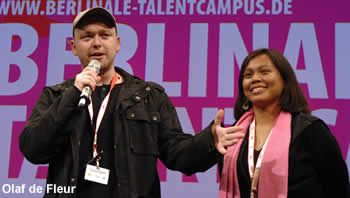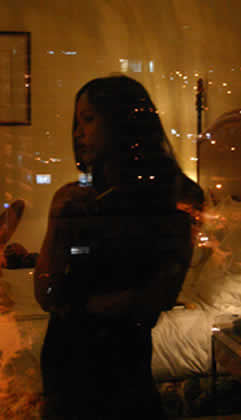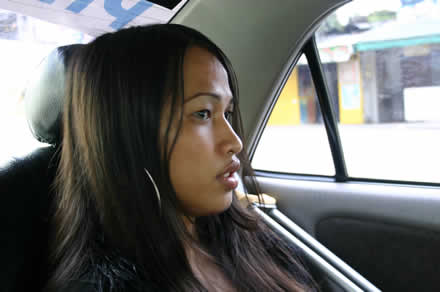The Amazing Truth About Queen Raquela tells the story of Raquela, a transsexual – or “lady-boy” – from the Philippines who dreams of escaping the streets of Cebu City for a fairy tale life in Paris. In order to make her dreams come true, she turns from prostitution toward the more lucrative business of Internet porn. Her success as a porn star brings new friends, including Valerie, a transexual in Iceland, and Michael, the owner of the website Raquela works for. Valerie helps Raquela get as far as Iceland. From there, Michael offers her a rendezvous in Paris.
Olaf de Fleur was born 1975 in a small village in Iceland called Budardalur. He studied physics in Reykjavik, graduating in 1995. Since then he has participated in numerous film projects, including both feature and documentary films. After deciding to pursue filmmaking, instead of going to film school, he founded an independent production company, Poppoli Pictures. Headed by de Fleur as director and producer, the team created “Blindsker,” which won the “Best Documentary” in the Icelandic Film Awards 2004 and “Africa United,” which won the same prize in 2005. Olaf de Fleur was nominated as the best Icelandic Filmmaker in 2005 and 2006 at cultural DV (newspaper) Awards and Best Director in 2005 at the Icelandic Film Awards. He was selected for the Berlinale Talent Campus in 2002 and  2003.
2003.
Bijan Tehrani: In The amazing Truth About Queen Raquela, you are presenting a fresh way of telling a story, a new visual language. How did you come up with the visual style of the film?
Olaf de Fleur: It was a mixture, as with all creative results, of mistakes and obstacles. When trying to finance the documentary, I would usually get a “no” in the sarcastic form of “it’s just another-third-world-tranny-film” and “it’s been done before”. Also, when looking at other films on the subject, I felt it had indeed been done before, so I decided to do something different; a film about the impossible dream of my subjects and not the typical biological film (i.e. will you get a breast transplant, sex change). I wanted to do it in a film language, not talking heads. So I decided to use the real world, real subjects up to certain extent, real situations, improvise and just see what happens. This has been done before in different forms, and I sought inspiration from Italian neo-realism, from Mike Leigh, from Von Trier. So I was just doing “a  film”; not pre-occupied with genre–shooting with my gut the entire time.
film”; not pre-occupied with genre–shooting with my gut the entire time.
BT: The line between what is real and what isn’t is so blurred and blended that one cannot tell them apart. How did you achieve this?
OF: I am not sure. It was the “gut” thing, shooting in faith of something was working. It’s easy to be wise right now, in an interview. But the fact is: I don’t know. I guess now I can see that the good thing about this is that it has the form of a narrative and perhaps the emotional result of a documentary. That makes me feel like I’ve achieved something, since documentaries are ten times more important than any fiction narrative for the world’s understanding of itself. I’m sure it also helps that I’ve done many documentaries and that my experience was resisting going into total fiction, hence the result.
BT: When it comes to performance, Raquela Rios offers a magical appearance in front of the camera. How did you find her and what was your method of working with her?
OF: We interviewed about thirty girls in the Philippines and Raquela stood out for her creativity and she turned out to be really smart. Despite being half-way on the street, she is extremely clever. I would step on the shoulders of her life and use her knowledge and her friends to make a script. Many scenes are authentic docu-moments and some are written and some are even improvs. We were always amazed by her talent of being able to improvise and deliver lines when needed. I take little credit, she is a natural.
BT: How did you cast the rest of the characters in the film? Was it based on a solid script or you were making changes and finding your actors as you were going on?
OF: Indeed that’s how it was. I found my characters as the story revealed itself through the course of the film. I just got an idea of what could happen, and sometimes found real people and sometimes made up characters. It was a very, very free film-making technique; I usually did not know what was going to happen, but again the “gut” played a key-role in making the film. Many days would turn out very different than planned, just because I was not restricted by a big budget or a big crew and that gives you flexibility to move and be alive with the art. I think it’s important to mix it up with big and small crews. Any story needs oxygen to be alive and breath, you can’t strangle with it with planning everything 100%.
BT: Is The Amazing Truth About Queen Raquela about a specific and unique subject or it can be applied to other issues of life?
OF: I guess I somewhat know now what it is about. When doing it, I had little idea. It was like going into “auto” mode. I’ve never experienced something like that before. It’s about impossible dreams, dreamers who pretend that their impossible dreams will come true; it’s about globalization, how our Western world values impose themselves upon poor cultures through Media. It’s about how we try and keep third world countries in place (difficulty for locals getting a VISA), how the Western world is greedy and selfish in its supposedly wondered nature. And in the arms of all these things, it’s about a pure human dream and how naturally clumsy life can be when handling our hopes.
BT: What was the reaction of Raquela after watching the finished film? Did you show your film to her while you where editing the film?
OF: We did show her on a regular basis and she was very happy with everything. When we were in Berlin, it was beautiful to see her there–this street-girl from the Philippines experiencing a big festival and winning best feature at the Berlinale Teddy Awards. It made me realize, when seeing Raquela in that environment, that just a year before she had been struggling in life and that she was now there, telling an important story to the world. And it made me realize that I was married to her for life, that I was the one polluting her life with dreams that most likely will never come true, that I’d have to watch over her in the future and take responsibility for my actions.
BT: Please tell us about your future projects.
OF: I’m working on several projects. A film called “Adequate Beings” here in Iceland, and then I’m working a film called “Antelopes”. To sound vague, it’s about about dirty secrets in a modern world, a film about how self-preservation becomes more important than justice. I’m also developing a few other projects, it’s just the typical imprisonment a workaholic get’s himself into.

